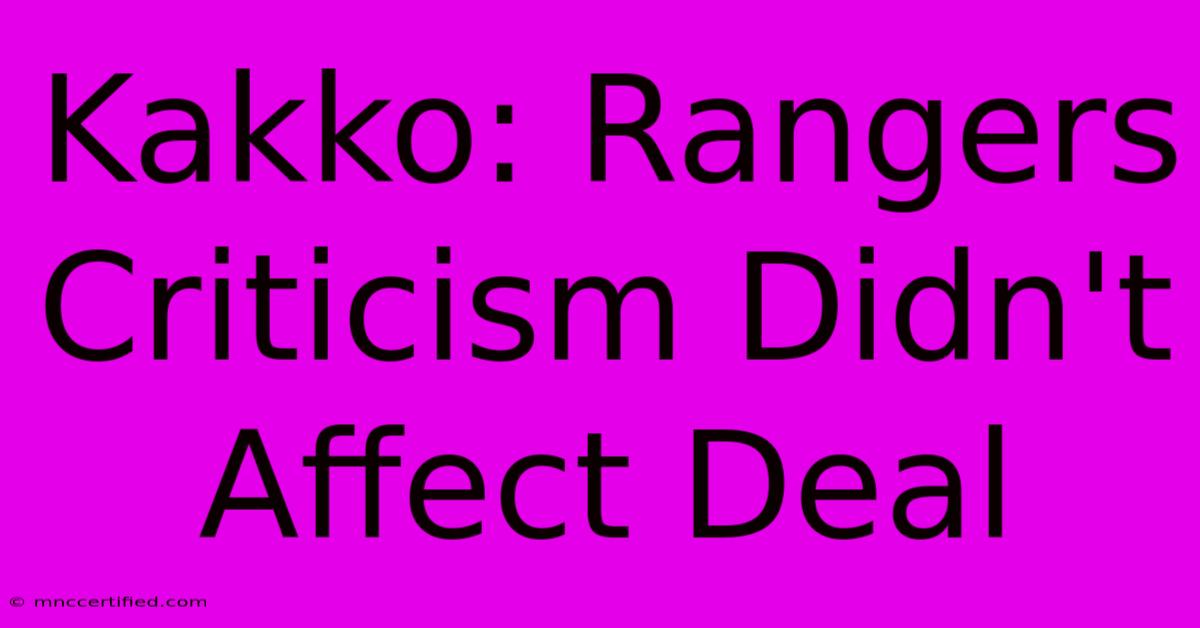Kakko: Rangers Criticism Didn't Affect Deal

Table of Contents
Kakko: Rangers Criticism Didn't Affect Kaapo Kakko's Contract Deal
The New York Rangers' decision to sign Kaapo Kakko to a long-term contract extension sent ripples through the hockey world. While some lauded the move, others questioned whether the hefty price tag was justified given Kakko's performance inconsistencies. The prevailing narrative, however, often focused on the external pressures and criticism surrounding the young Finnish forward. This article will examine the claim that external criticism didn't significantly affect the Rangers' decision to extend Kaapo Kakko's contract.
Analyzing the Criticism of Kaapo Kakko
Since being drafted second overall in 2019, Kaapo Kakko has faced scrutiny. He hasn't quite lived up to the expectations placed on a player selected so highly. Inconsistency has been a recurring theme, with flashes of brilliance interspersed with periods of relative quiet. Critics pointed to his scoring woes, his struggles with consistency, and his perceived lack of impact in crucial games. Online forums and sports media outlets frequently featured discussions analyzing his performance and questioning his future with the team.
The Narrative of External Pressure
The prevailing narrative suggested that the Rangers' front office, potentially swayed by public and media opinion, might hesitate to commit long-term to a player facing such criticism. The idea was that the pressure to justify the high draft pick and the team's investment would lead to a more cautious approach. This narrative painted a picture of a team potentially influenced by short-term concerns over long-term potential.
Why the Rangers Didn't Waver: A Deeper Look
Despite the considerable criticism, the Rangers ultimately decided to extend Kaapo Kakko's contract. Several factors likely contributed to this decision, suggesting that external pressures played a minimal role:
-
Internal Assessment: The Rangers likely based their decision on a thorough internal evaluation of Kakko's performance and potential. This included detailed statistical analysis, scouting reports, and assessments from coaching staff. They saw aspects beyond simple point totals, focusing on his development, work ethic, and overall contributions to the team.
-
Long-Term Vision: The Rangers are clearly committed to a long-term plan. They didn't react to short-term fluctuations in Kakko's performance. They recognized his potential for future growth and saw the contract as an investment in that potential. This indicates a strategic approach based on a longer-term vision, not just on immediate results.
-
Trust in Development: The team's commitment to Kakko's development is also a key factor. They understand that young players often experience inconsistencies. Extending his contract demonstrates faith in his ability to continue developing and reaching his full potential under the Rangers' system.
-
Beyond the Numbers: While goals and assists are important metrics, the Rangers likely factored in other contributions – Kakko's physicality, his defensive play, and his overall impact on the team's dynamics. These intangible aspects might not always show up in basic statistics, but are nonetheless valuable to the team's overall success.
Conclusion: Performance, Not Pressure, Dictated the Deal
In conclusion, while criticism surrounding Kaapo Kakko's performance was certainly present, the Rangers' decision to extend his contract wasn't primarily driven by a need to appease public opinion or media scrutiny. Instead, the deal reflects a strategic, long-term view, based on the team's internal assessment of Kakko's potential and their commitment to his development. The Rangers’ decision underscores the importance of a holistic evaluation, recognizing that a player's true value often extends beyond simple statistics and easily digestible narratives. The focus was on Kakko's potential, not on reacting to the external noise.
Keywords: Kaapo Kakko, Rangers, contract, extension, criticism, hockey, NHL, analysis, performance, potential, development, long-term, New York Rangers, scoring, inconsistency, impact, draft pick, contract negotiation
Off-Page SEO Strategies:
- Guest Blogging: Write guest posts on relevant sports blogs and websites, linking back to this article.
- Social Media Marketing: Share the article on relevant social media platforms, using relevant hashtags (e.g., #KaapoKakko #NYRangers #NHL).
- Forum Participation: Engage in relevant online hockey forums and communities, subtly linking back to the article when appropriate.
- Outreach to Journalists: Share the article with relevant sports journalists and bloggers.
This comprehensive approach will help your article achieve a higher ranking in Google search results. Remember to monitor the performance of your article using Google Analytics and adjust your strategy as needed.

Thank you for visiting our website wich cover about Kakko: Rangers Criticism Didn't Affect Deal. We hope the information provided has been useful to you. Feel free to contact us if you have any questions or need further assistance. See you next time and dont miss to bookmark.
Featured Posts
-
Virgin River Wedding A Look Back
Dec 20, 2024
-
Putin Trump Potential Talks
Dec 20, 2024
-
Ariana Grande Ethan Slater Move On
Dec 20, 2024
-
Condemnation Racist Abuse Against Singo In Monaco
Dec 20, 2024
-
The New Superman A Superheros Return
Dec 20, 2024